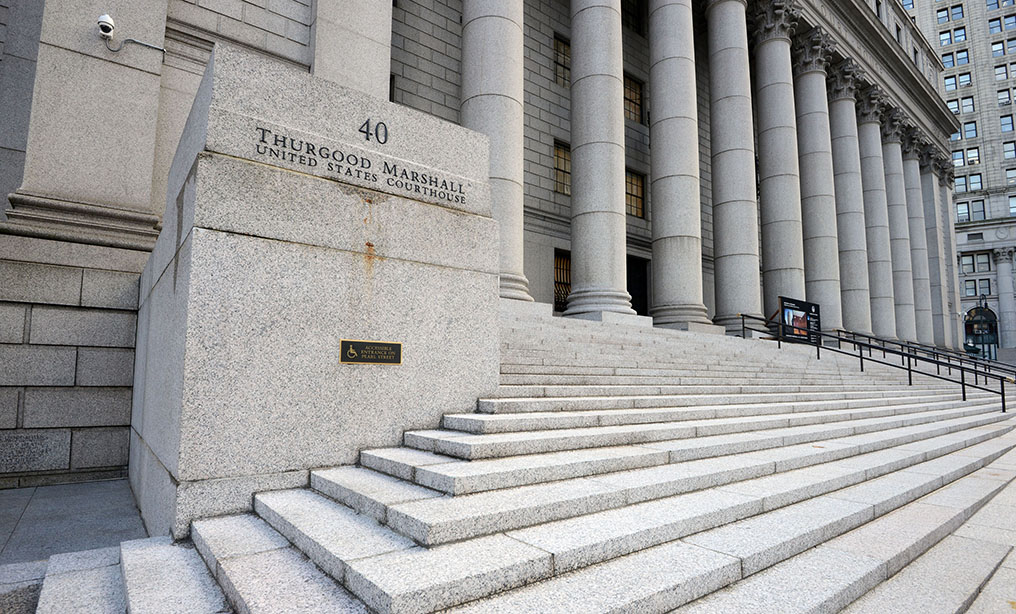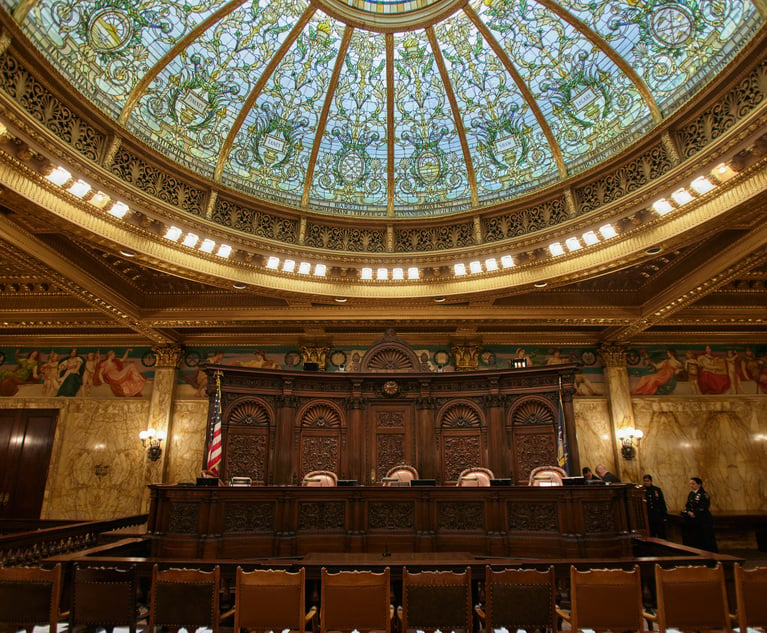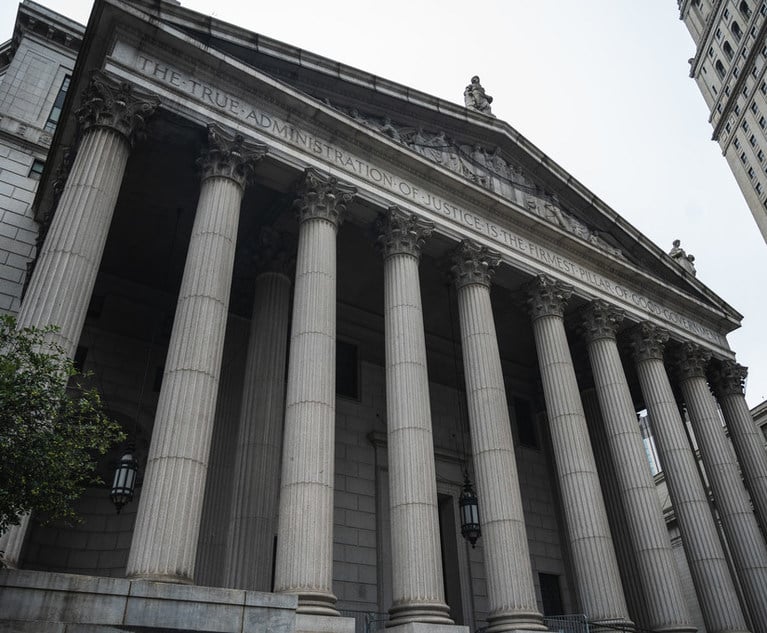Attorney Booted From 2nd Circuit Argument Defends Comments Toward Panel
Legal ethics experts, however, warned that Bank's comments could lead to further probes into whether he had violated the New York Rules of Professional Conduct.
December 16, 2019 at 01:20 PM
7 minute read
 The Second Circuit Court of Appeals at the Thurgood Marshall U.S. Courthouse in lower Manhattan. Photo: Rick Kopstein
The Second Circuit Court of Appeals at the Thurgood Marshall U.S. Courthouse in lower Manhattan. Photo: Rick Kopstein
A New York lawyer who was removed from the U.S. Court of Appeals for the Second Circuit last week over a viral courtroom blowup defended his comments Monday to the panel that heard his appeal.
In a letter, solo attorney Todd Bank, from Kew Gardens, Queens, stopped short of apologizing for loudly questioning the court's preparation and grasp on his case, but he did admit that he could have handled the situation in a "more diplomatic manner."
The Dec. 11 exchange between Bank and Judge Denny Chin led to Bank's removal from the courtroom by security, after Chin admonished him for "discourteous" and "inappropriate" behavior before the court. Audio of the incident has since been widely shared on social media by appellate lawyers, who seemed shocked by Bank's actions.
Bank, however, decried in his letter a "double standard," which he said prevents attorneys from pushing back against judges in certain circumstances.
"That does not change the nature of my own comments, but it does show, in my view, that there is a double standard that those who appear before the court are loath to violate for fear that the judges will take their personal feelings into account when making their rulings, whereas judicial integrity requires (indeed, is partly defined by) the opposite," Bank wrote.
"To be sure, this fear is not limited to this court but, instead, is endemic in our, and, I imagine, any, legal system," he said.
Bank lost his appeal Monday in a challenge to a local rule for the Eastern District of New York bar that requires applicants to get a sponsoring affidavit from another attorney outlining what they know about the applicant's character and legal experience.
But the dust still had yet to settle in the dispute, and ethics attorneys said that Bank, who has branded himself the "annoyance lawyer," could potentially be vulnerable to disciplinary proceedings.
Last week's hearing started innocuously enough, with Bank telling the appellate panel he had nothing new to add beyond what he wrote in his briefs. He said he assumed the panel was familiar with the record, and he asked whether anyone had questions for him.
Chin, one of three Second Circuit judges hearing appeals that day, asked about the alleged harm to the lawyer challenging the affidavit, which in turn drew an assertion from Bank that the judge's remarks had "nothing to do with this case."
The hearing quickly went off the rails from there, as Chin pressed Bank to articulate what the alleged injury was—essentially, why he's in court in the first place.
"Are you serious judge? With all due respect, I don't know what to say," Bank shot back.
Chin responded: "You know what, I withdraw my question. You can sit down."
"OK, well, thank you. Thank you very much judge. I see that you read the briefs thoroughly," Bank said sarcastically.
An audibly irritated Chin informed Bank that he was acting in a "disrespectful and discourteous manner" and then had Bank removed from the courtroom when he tried to take his rebuttal time.
"You've waived rebuttal," Chin shouted from the bench, as a second judge chimed in as well.
Assistant U.S. Attorney Matthew Modafferi, arguing on behalf of the government, rested on the arguments in the briefs, ending oral arguments just minutes after they got started.
On Monday, Bank disputed Chin's line of questioning and said that he "regret[s] not having had a productive oral argument."
"I hope that the court and those who appear before it, including me, will learn from our experience," he said in the letter.
Legal ethics experts, however, warned that Bank's comments could lead to further probes into whether he had violated the New York Rules of Professional Conduct.
Rule 8.4(d) and 8.4(h) both forbid attorneys from engaging in behavior that is "prejudicial to the administration of justice" or that "adversely reflects on the lawyer's fitness." Another rule, 3.3(f), states that lawyers appearing before a tribunal shall not "engage in undignified or discourteous conduct" or "engage in conduct intended to disrupt the tribunal."
Any investigation would likely be premised on the need to maintain the decorum of civil court proceedings, said Michael Ross, an attorney ethics lawyer based in Manhattan.
"Civility is an important issue," Ross said. "Civility is very much a part of what federal and state courts demand," both in terms of professional conduct and in interactions with the court.
The Second Circuit, Eastern District and the state appellate divisions all staff grievance committees responsible for investigating possible violations of ethical standards. Such reviews could result from a complaint that has been filed against an attorney or by a sua sponte review initiated by the panel itself.
Given the viral nature of Bank's comments, "it's almost certain that one of them … would be looking into whether the lawyer's conduct violated one of those rules," Ross said.
Richard Maltz, who reviewed an audio recording of the incident, said that absent any prior disciplinary actions against Bank, it was more likely to result in a private admonishment, rather than public discipline.
Professional rules involving actions before tribunals, he said, are rarely used in ethics proceedings, and it would be "going pretty far" to target Bank's fitness to practice. Bank, Maltz said, was lucky not to have been held in contempt, which would have added additional layers of complexity to the review.
Most likely, Bank could receive a letter or some other form of private reprimand, said Maltz, a partner with Frankfurt Kurnit Klein & Selz.
"I think his conduct was snooty and arrogant, but I'm not sure the state would sanction him for it," Maltz said.
He continued: "They may want to do something. I just don't think it would rise to the level of public discipline."
It was likely that any ethics investigation would be handled by the Second Circuit's grievance panel, which has the ability to refer disciplinary matters to the Committee on Admissions and Grievances for investigation, a hearing or report. Much like the parallel state process, disciplinary actions are generally kept confidential, unless the panel orders otherwise.
Contacted by phone late last week, Bank said he was not aware of any ethics proceedings against him. He said he did not plan to issue an apology but would consider clarifying his position in writing to the court.
"If I misspoke, or what have you, I might put that on the record," he said in an interview.
Chief Judge Robert A. Katzmann, who heads the Second Circuit, declined to comment because the situation was "possibly a live matter."
Read More:
NY Lawyer Who Was Ejected From 2nd Circuit Courtroom Just Lost His Case
'You Are Acting Inappropriately': 2nd Circuit Scolds Lawyer Before Kicking Him Out
This content has been archived. It is available through our partners, LexisNexis® and Bloomberg Law.
To view this content, please continue to their sites.
Not a Lexis Subscriber?
Subscribe Now
Not a Bloomberg Law Subscriber?
Subscribe Now
NOT FOR REPRINT
© 2025 ALM Global, LLC, All Rights Reserved. Request academic re-use from www.copyright.com. All other uses, submit a request to [email protected]. For more information visit Asset & Logo Licensing.
You Might Like
View All
Decision of the Day: Trial Court's Sidestep of 'Batson' Deprived Defendant of Challenge to Jury Discrimination

Decision of the Day: Commercial Division Finds Defendant Engaged in Unfair Competition Against Plaintiff

Decision of the Day: Court Rules on Judgment Motions Over Police Killing of Pet Dog While Executing Warrant

Decision of the Day: JFK to Paris Stowaway's Bail Revocation Explained
Law Firms Mentioned
Trending Stories
- 1Litigator of the Week Runners-Up and Shout-Outs: Davis Wright Tremaine, Wilmer and More
- 2Forum Clause Axes $844M Case Against Reinsurer Over Deadly Plane Crash, Judge Rules
- 3Latham Adds Former Treasury Department Lawyer for Cross-Border Deal Guidance
- 4Understanding the HEMS Standard in Trusts
- 5Mergers Are About People, Not Paperwork: Here’s Why
Who Got The Work
J. Brugh Lower of Gibbons has entered an appearance for industrial equipment supplier Devco Corporation in a pending trademark infringement lawsuit. The suit, accusing the defendant of selling knock-off Graco products, was filed Dec. 18 in New Jersey District Court by Rivkin Radler on behalf of Graco Inc. and Graco Minnesota. The case, assigned to U.S. District Judge Zahid N. Quraishi, is 3:24-cv-11294, Graco Inc. et al v. Devco Corporation.
Who Got The Work
Rebecca Maller-Stein and Kent A. Yalowitz of Arnold & Porter Kaye Scholer have entered their appearances for Hanaco Venture Capital and its executives, Lior Prosor and David Frankel, in a pending securities lawsuit. The action, filed on Dec. 24 in New York Southern District Court by Zell, Aron & Co. on behalf of Goldeneye Advisors, accuses the defendants of negligently and fraudulently managing the plaintiff's $1 million investment. The case, assigned to U.S. District Judge Vernon S. Broderick, is 1:24-cv-09918, Goldeneye Advisors, LLC v. Hanaco Venture Capital, Ltd. et al.
Who Got The Work
Attorneys from A&O Shearman has stepped in as defense counsel for Toronto-Dominion Bank and other defendants in a pending securities class action. The suit, filed Dec. 11 in New York Southern District Court by Bleichmar Fonti & Auld, accuses the defendants of concealing the bank's 'pervasive' deficiencies in regards to its compliance with the Bank Secrecy Act and the quality of its anti-money laundering controls. The case, assigned to U.S. District Judge Arun Subramanian, is 1:24-cv-09445, Gonzalez v. The Toronto-Dominion Bank et al.
Who Got The Work
Crown Castle International, a Pennsylvania company providing shared communications infrastructure, has turned to Luke D. Wolf of Gordon Rees Scully Mansukhani to fend off a pending breach-of-contract lawsuit. The court action, filed Nov. 25 in Michigan Eastern District Court by Hooper Hathaway PC on behalf of The Town Residences LLC, accuses Crown Castle of failing to transfer approximately $30,000 in utility payments from T-Mobile in breach of a roof-top lease and assignment agreement. The case, assigned to U.S. District Judge Susan K. Declercq, is 2:24-cv-13131, The Town Residences LLC v. T-Mobile US, Inc. et al.
Who Got The Work
Wilfred P. Coronato and Daniel M. Schwartz of McCarter & English have stepped in as defense counsel to Electrolux Home Products Inc. in a pending product liability lawsuit. The court action, filed Nov. 26 in New York Eastern District Court by Poulos Lopiccolo PC and Nagel Rice LLP on behalf of David Stern, alleges that the defendant's refrigerators’ drawers and shelving repeatedly break and fall apart within months after purchase. The case, assigned to U.S. District Judge Joan M. Azrack, is 2:24-cv-08204, Stern v. Electrolux Home Products, Inc.
Featured Firms
Law Offices of Gary Martin Hays & Associates, P.C.
(470) 294-1674
Law Offices of Mark E. Salomone
(857) 444-6468
Smith & Hassler
(713) 739-1250






